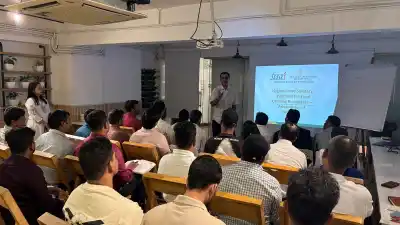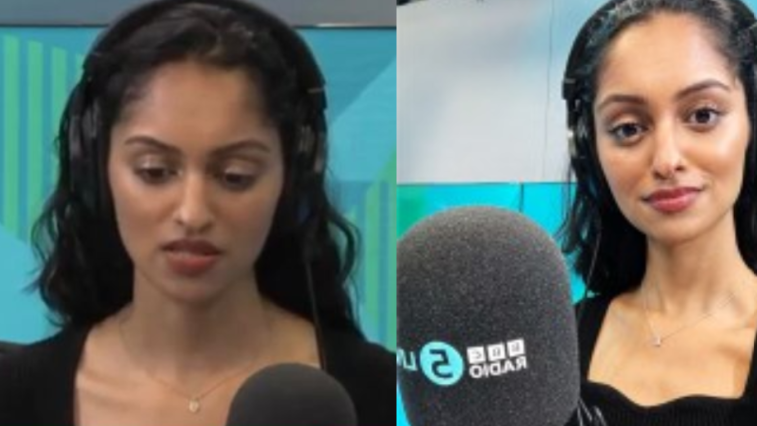

The harrowing final hours of 6-year-old Hind Rajab became a flashpoint for media ethics when Indian-origin journalist Karishma Patel resigned from her position at the BBC, citing the network's handling of the child's story as the breaking point in her five-year career with the broadcasting giant.
By the time the BBC published its report on Hind Rajab, the Israeli military had already fired approximately 300 rounds at the car where the child was trapped with her deceased relatives. The network's coverage, which one LinkedIn user described as "shameful," came under intense scrutiny after audio recordings of Hind's final moments circulated widely across social media platforms, revealing the stark disconnect between the reality on the ground and the BBC's framing of events.
The audio recordings captured a desperate situation unfolding in real-time. "They are shooting at us. The tank is next to me," a woman's voice can be heard saying. When asked if they were hiding, she replied, "Yes, in the car. We're next to the tank."
As the conversation continued, the family was asked if they were inside the vehicle. What followed were horrifying screams as Israeli forces allegedly opened fire on the car, with gunshots clearly audible in the recording. Hind's aunt, uncle, and three cousins were killed instantly, but somehow, the six-year-old survived.
Left alone with the bodies of her family members, Hind made desperate pleas for help: "Come. Take me. Will you come and take me?" When asked if she wanted to be rescued, the child responded, "I'm so scared. Please come. Please call someone to come and take me." The woman on the other end attempted to reassure Hind that rescue would arrive soon.
For more than three hours, Hind reportedly made repeated calls to emergency services. The Palestine Red Crescent Society (PRCS) eventually dispatched two paramedics to assist her. The rescue attempt, however, ended in further tragedy. According to reports, the Israeli army targeted the ambulance upon its arrival, killing both paramedics.
The PRCS subsequently accused Israel of deliberately targeting the ambulance on January 29, despite having received clearance from the Israeli military for the rescue operation. Hind, along with her would-be rescuers, was shot dead. The Israeli military has denied involvement in the attack, claiming their forces were not in the vicinity of the vehicle when the incident occurred.
For Karishma Patel, the BBC's handling of Hind Rajab's story represented a fundamental failure of journalistic responsibility. In her column for The Independent following her resignation, Patel revealed that she had pitched the story of the thirteen-year-old trapped in a car with her murdered relatives to her team at the BBC twice, but the network initially refused to run it.
When the BBC eventually published the story, they used the term "found dead" rather than "murdered" – terminology that many social media users quickly highlighted as problematic. The article concluded with a contextual note that "Israel has previously accused Hamas of using ambulances to transport its weapons and fighters," which many interpreted as an attempt to justify or contextualize the actions taken against the ambulance dispatched to rescue Hind.
Patel argued that this was not an isolated incident but part of a pattern in the BBC's coverage of Palestinian children caught in the conflict. She pointed to the network's decision to pull the documentary "Gaza: How to Survive a Warzone" because its 13-year-old narrator was related to a deputy agriculture minister in Gaza's Hamas-led government.
Patel contended that the BBC could have retained the documentary with an appropriate disclaimer rather than removing it entirely. She viewed the decision as the network deliberately avoiding the message that "Israel's actions are harming Palestinian children."
When BBC Director General Tim Davie and Chair Dr. Samir Shah faced questioning from a UK parliamentary committee regarding the documentary's removal, they defended their decision by citing "serious flaws" in its production. Patel acknowledged the BBC's recognition of errors in the documentary's creation but criticized the organization for failing to address what she described as an "overall lack of editorial integrity in covering Gaza."
"This decision prompted me and more than 1,000 others – including Gary Lineker and Miriam Margolyes – to sign an open letter condemning the move," Patel wrote in her Independent column.
Patel, who spent five years at the BBC, criticized the organization for displaying what she called a "shocking level of editorial inconsistency" in its reporting on Gaza. "I'm about to make a bold claim: truth exists," she stated, emphasizing that "editorial bravery is key."
The former BBC presenter argued that treating "both sides" of a story as equally valid, particularly when one side is substantiated by significant evidence, effectively distorts truth rather than illuminating it. "A news outlet that refuses to come to conclusions becomes a vehicle in informational warfare, where bad faith actors flood social media with unfounded claims, creating a post-truth 'fog'," she wrote.
Patel asserted that "there's enough evidence of what Israel has done," directly challenging her former employer: "When will the BBC conclude that Israel IS violating international law, and shape its coverage around that truth?"
Patel's criticism has resonated with others observing the BBC's coverage. A Reddit user suggested that while the BBC identifies wrongdoing by Israel, it deliberately avoids reaching the "natural conclusion of 'why does Israel keep blowing up children'" as such a conclusion would "always run into the territory of discussing Israeli apartheid and genocide." The commenter characterized the BBC's coverage of Gaza as "a glaring outlier from their normal coverage."
Another user pleaded, "Please BBC make an article that summarises the death caused by both sides and how it has often been Israel practicing 'an eye for an eye and an arm and a leg'." This commentator felt the BBC's current approach "makes it like Israel is being unreasonably attacked."
Patel concluded her piece with a fundamental lesson taught in journalism schools: "The journalist's job isn't to report that it may or may not be raining. It's to look outside and tell the public if it is. And let me tell you: there's a storm."
Having left the BBC after four and a half years of news reading, reporting, and producing, Patel announced on LinkedIn that she was moving to the Britain Palestine Media Centre as Senior Social Media Engagement Officer, where she would lead social media journalism efforts and support news outlets in their coverage of Palestine-related stories.